10 Essential Tips for Choosing the Right IT Consultant for Small Business

10 Essential Tips for Choosing the Right IT Consultant for Small Business
Introduction
Choosing the right IT consultant is crucial for small businesses looking to boost their technological capabilities. As technology becomes increasingly integral to operations, the risks associated with selecting the wrong advisor grow significantly. Wasted resources and missed opportunities can stem from poor choices in this area. This article presents ten essential tips designed to empower businesses in navigating the selection process effectively. By doing so, organizations can ensure they partner with the right IT consultant tailored to their unique needs.
How can these strategies not only help in finding a suitable consultant but also foster a successful, long-term collaboration? Let's explore the features, advantages, and benefits of these approaches.
Initial Data Offering: Access Quality Data for Informed IT Consultant Selection
Accessing the Initial Data Offering's platform provides companies with a diverse range of high-quality datasets, all powered by SavvyIQ's advanced AI-driven technology. What does this mean for your business? It means you can gain valuable insights into past advisor performance, client satisfaction, and industry trends, which are crucial for making informed decisions.
By leveraging this extensive data, businesses can significantly enhance their selection process for IT advisors. The advantage here is clear: with a deeper understanding of the metrics that matter, companies can reduce risks associated with advisor engagements. This ultimately increases the likelihood of successful partnerships.
In summary, utilizing these datasets not only empowers companies to make smarter choices but also fosters a more strategic approach to advisor selection. How could this data transform your decision-making process? Consider the potential impact on your organization's success.
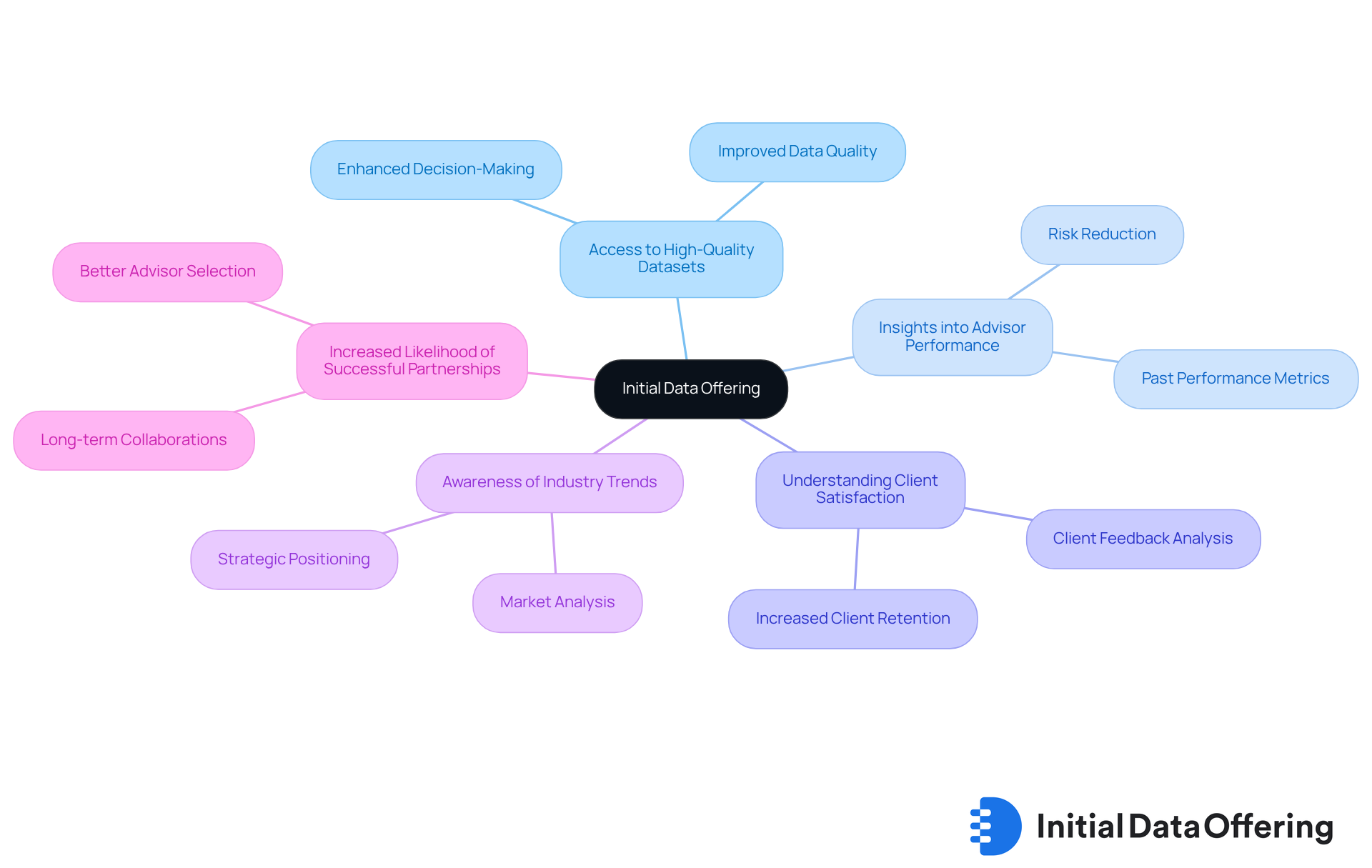
Define Clear Project Goals: Establish Expectations for IT Consultant Engagement
Establishing clear objectives is essential for effective IT advisory partnerships. Businesses should start by identifying the specific problems they aim to solve, the desired outcomes, and the key performance indicators (KPIs) that will measure success. This clarity not only aligns the consultant's efforts with the organization's strategic goals but also increases the chances of successful implementation.
Studies reveal that initiatives with clearly defined objectives are significantly more likely to succeed. In fact, up to 90% of endeavors are completed on schedule and within budget in high-performing organizations. Conversely, 67% of initiatives fail due to the undervaluation of management, highlighting the importance of clear goal setting. Furthermore, 68% of organizations emphasize the need to cultivate management skills for improved results, underscoring the necessity for a capable team to achieve these objectives.
For instance, a case study on effective resource management showed that companies adhering to best practices in project planning, including clear goal setting, experienced marked improvements in project outcomes. By prioritizing clarity in objectives, organizations can foster a more productive collaboration with an IT consultant for small business. This ensures that both parties are focused on achieving measurable results.
How can your organization benefit from setting clear objectives? By doing so, you not only enhance collaboration but also pave the way for successful project outcomes.
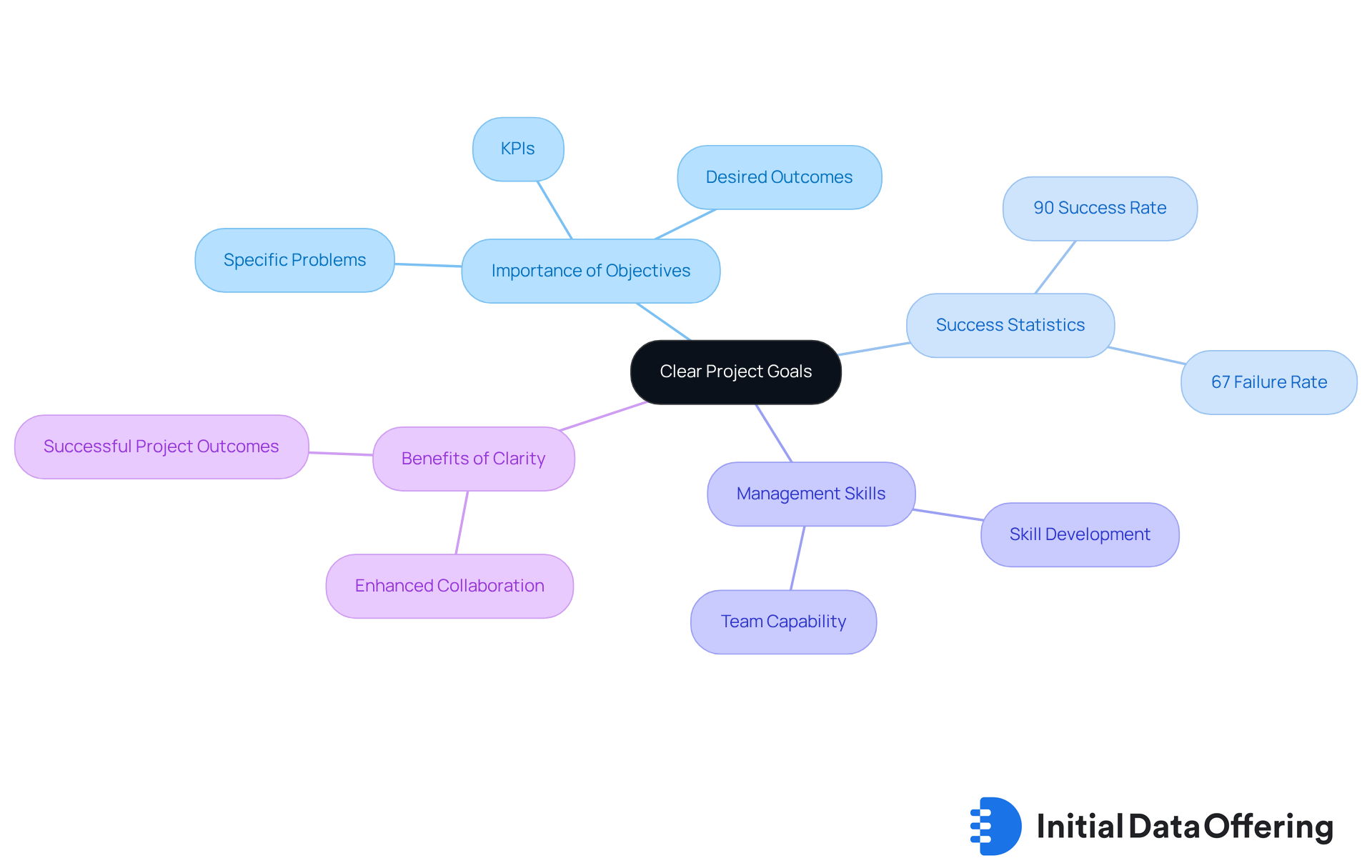
Evaluate Experience and Expertise: Choose IT Consultants with Relevant Backgrounds
When selecting an IT consultant for small business, businesses must thoroughly evaluate their experience and expertise in relevant fields. This evaluation includes examining previous projects, industry certifications, and customer testimonials. Consultants with recognized certifications, such as CompTIA Security+ or AWS Certified Solutions Architect, not only demonstrate their commitment to professional growth but also enhance their credibility with prospective customers. In fact, 75% of employers believe that certified employees add significant value, often estimated at $10,000 or more annually.
Furthermore, companies should consider the advisor's track record of customer satisfaction. An IT consultant for small business who has a proven history in similar projects is more likely to understand the unique challenges faced by the company and provide tailored solutions. For instance, companies are increasingly favoring specialized experts who can offer focused knowledge, as evidenced by the growing trend of clients shifting towards smaller, specialized firms for high-value projects. This shift underscores the importance of selecting advisors based on their past achievements and the specific needs of the organization, ensuring a partnership that fosters innovation and strategic growth.
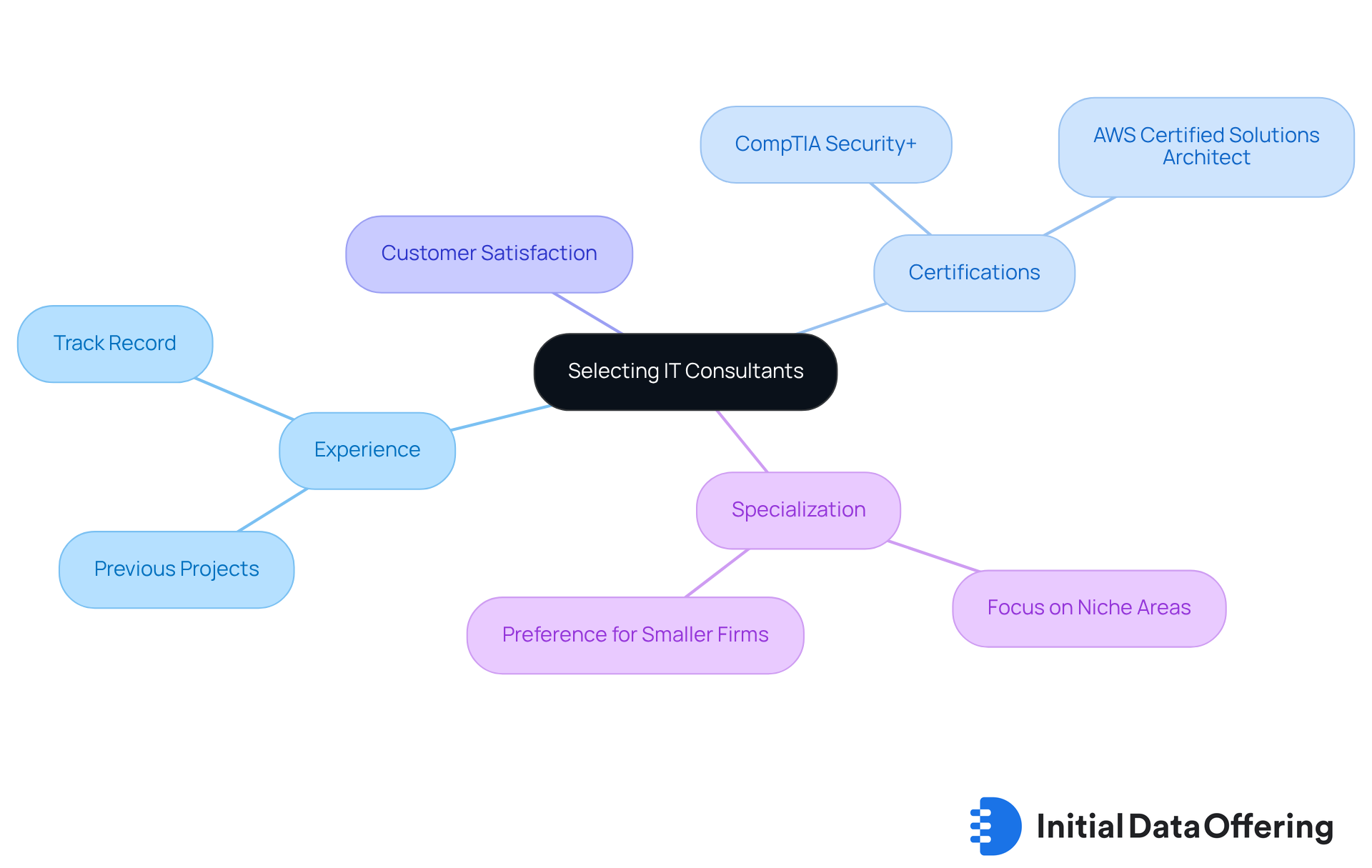
Check References and Client Feedback: Assess Consultant Reliability and Performance
Before finalizing an advisor, businesses should conduct thorough reference checks. This process involves reaching out to former customers to inquire about their experiences, the advisor's strengths, and any areas for improvement. By examining this feedback, companies gain valuable insights into the advisor's reliability and effectiveness in achieving results.
Why is customer feedback so crucial? According to Lynda McDermott, repeat transactions serve as the best evaluation metric for customer satisfaction. This underscores the importance of gathering customer feedback when assessing performance. Moreover, as Ken Blanchard aptly states, "Feedback is the breakfast of champions," highlighting the critical role of feedback in performance evaluation.
Organized reference checks can significantly enhance the selection process. They ensure that companies choose advisors who not only meet their needs but also demonstrate a proven history of success. Yves Lermusi emphasizes that conducting reference checks earlier in the hiring process can improve their effectiveness. By prioritizing client feedback and considering four key criteria for selecting references - freshness, length, closeness, and nature of the relationship - organizations can make informed decisions. This approach leads to better outcomes and fosters long-term partnerships.
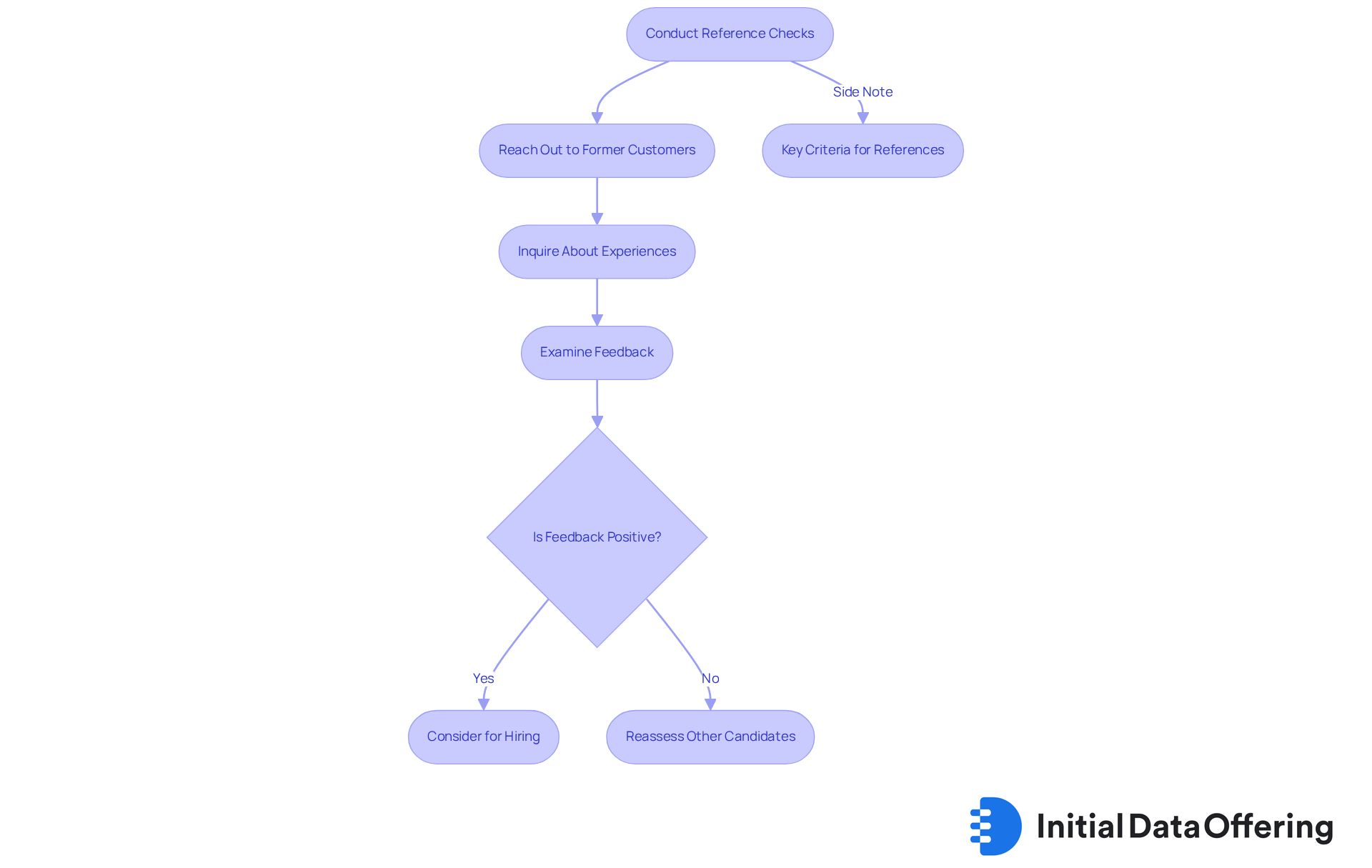
Understand Problem-Solving Approach: Ensure Consultant Compatibility with Business Needs
When selecting an IT advisor, companies must consider the advisor's problem-solving approach. This includes examining how they tackle challenges, the analytical techniques they use, and their ability to adapt to changing circumstances. Advisors who demonstrate strong adaptability often achieve higher success rates. In fact, research indicates that 40% of advisors struggle with sales conversion, underscoring the need for effective strategies.
An advisor whose methods align with the specific needs of the organization is more likely to provide effective solutions, leading to successful outcomes. Aligning advisor methodologies with organizational goals not only boosts the likelihood of project success but also fosters a collaborative environment where innovative solutions can thrive. As Melisa Liberman points out, "For self-employed professionals, consistent promotion and development are the lifelines of growth," which emphasizes the importance of aligning services with strategic priorities.
To initiate a productive dialogue with an advisor, companies should ask about the specific methods they employ and how these can be tailored to meet the organization's unique challenges. This inquiry not only clarifies the advisor's approach but also sets the stage for a partnership that can drive meaningful results.
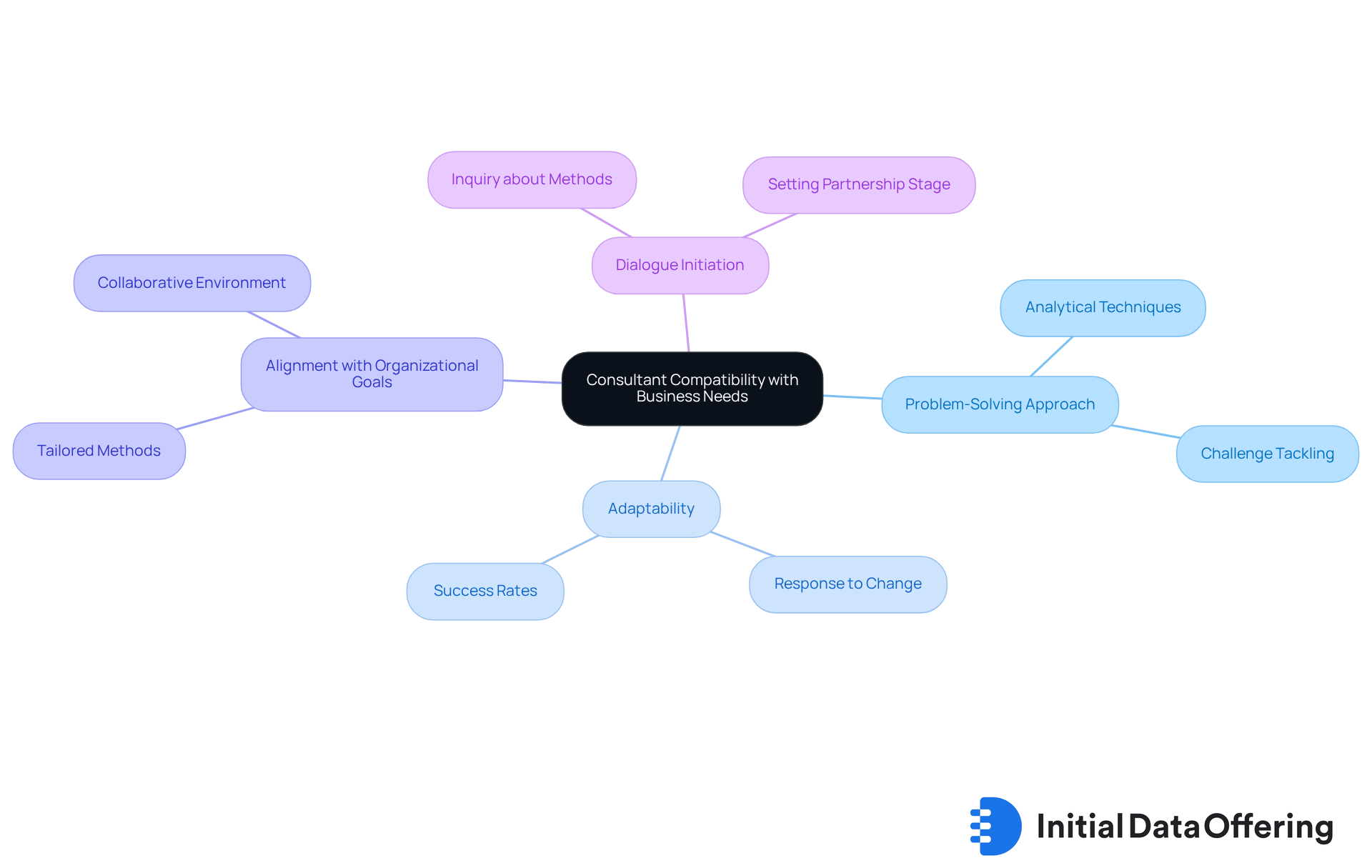
Discuss Pricing Structures: Align Budget with IT Consultant Services
When engaging an IT consultant for small business, discussing pricing structures early in the conversation is crucial. Businesses should seek clarity on how fees are structured-whether hourly, project-based, or retainer-when working with an IT consultant for small business and ensure that these align with their budget. Understanding the cost implications of various services provided by an IT consultant for small business helps businesses make informed decisions and avoid unexpected expenses.
Typical IT advisory fees in the U.S. range from $100 to $300 per hour. Senior professionals, with over eight years of experience, often charge between $250 to $500 or more per hour. This variation emphasizes the importance of experience in determining costs. Projects requiring specialized skills, such as cloud architecture or data science, typically command higher fees due to their complexity. As noted, "It is hard to define a standard fee for IT consulting services, as there are numerous factors affecting the final costs."
Aligning advisor fees with your budget not only facilitates smoother negotiations but also increases the chances of success when working with an IT consultant for small business. Research indicates that companies typically see a median ROI of seven times their initial investment in coaching. This underscores the value of strategic budget alignment in IT consulting engagements.
Therefore, when choosing an IT consultant for small business, consider:
- Does their pricing structure match your financial capabilities and objectives?
Ensuring this alignment promotes a successful partnership.
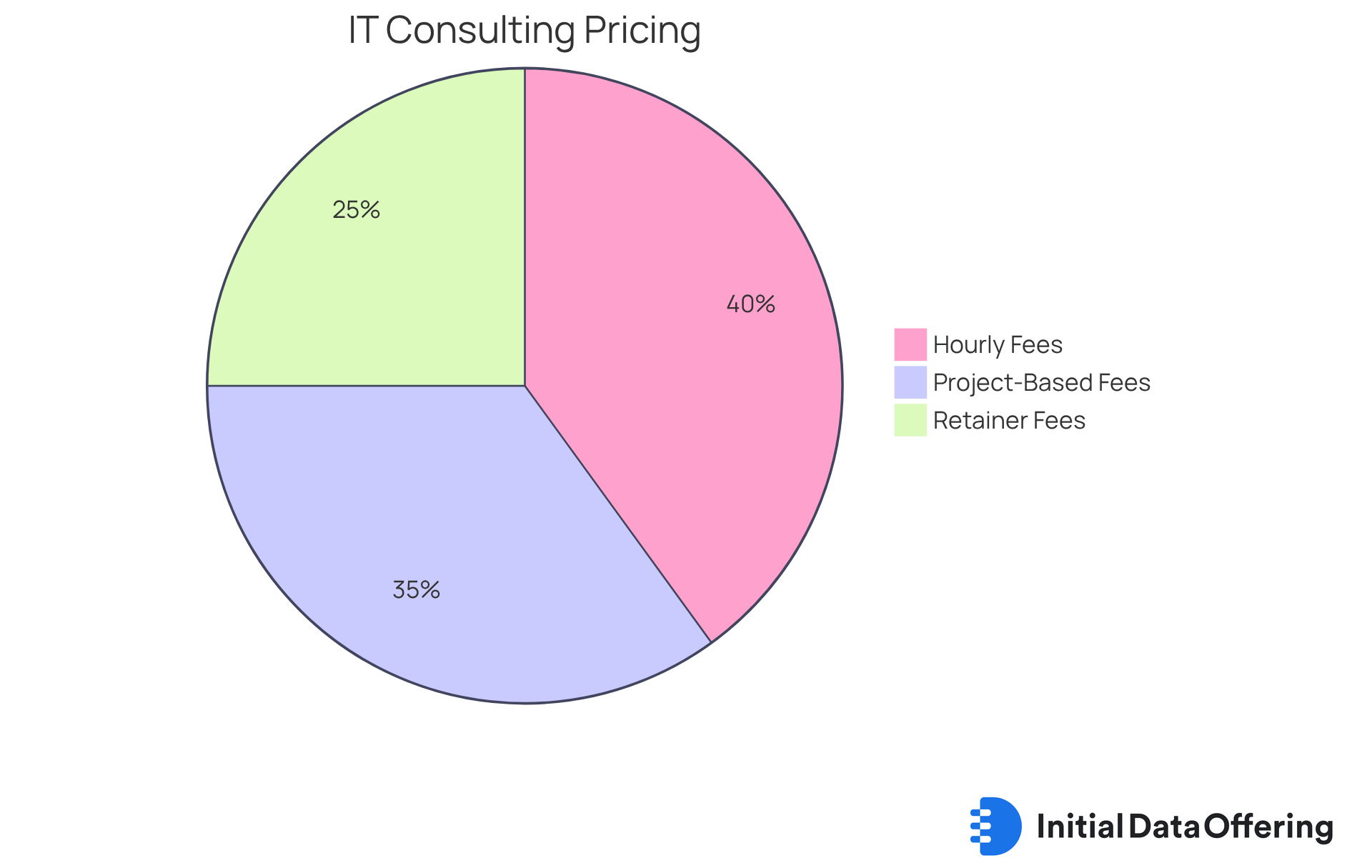
Assess Communication Skills: Ensure Effective Collaboration with IT Consultants
Evaluating a professional's communication abilities is crucial for fostering effective collaboration.
- Feature: Companies should assess how well consultants articulate their ideas, listen to client concerns, and provide updates on project progress.
- Advantage: This evaluation helps identify strengths and areas for improvement in communication skills.
- Benefit: Ultimately, effective communication cultivates a collaborative environment, significantly increasing the likelihood of project success.
Have you considered how enhancing communication can transform your team's dynamics? By prioritizing these skills, organizations can create a more engaged workforce, leading to better outcomes and stronger relationships with clients.
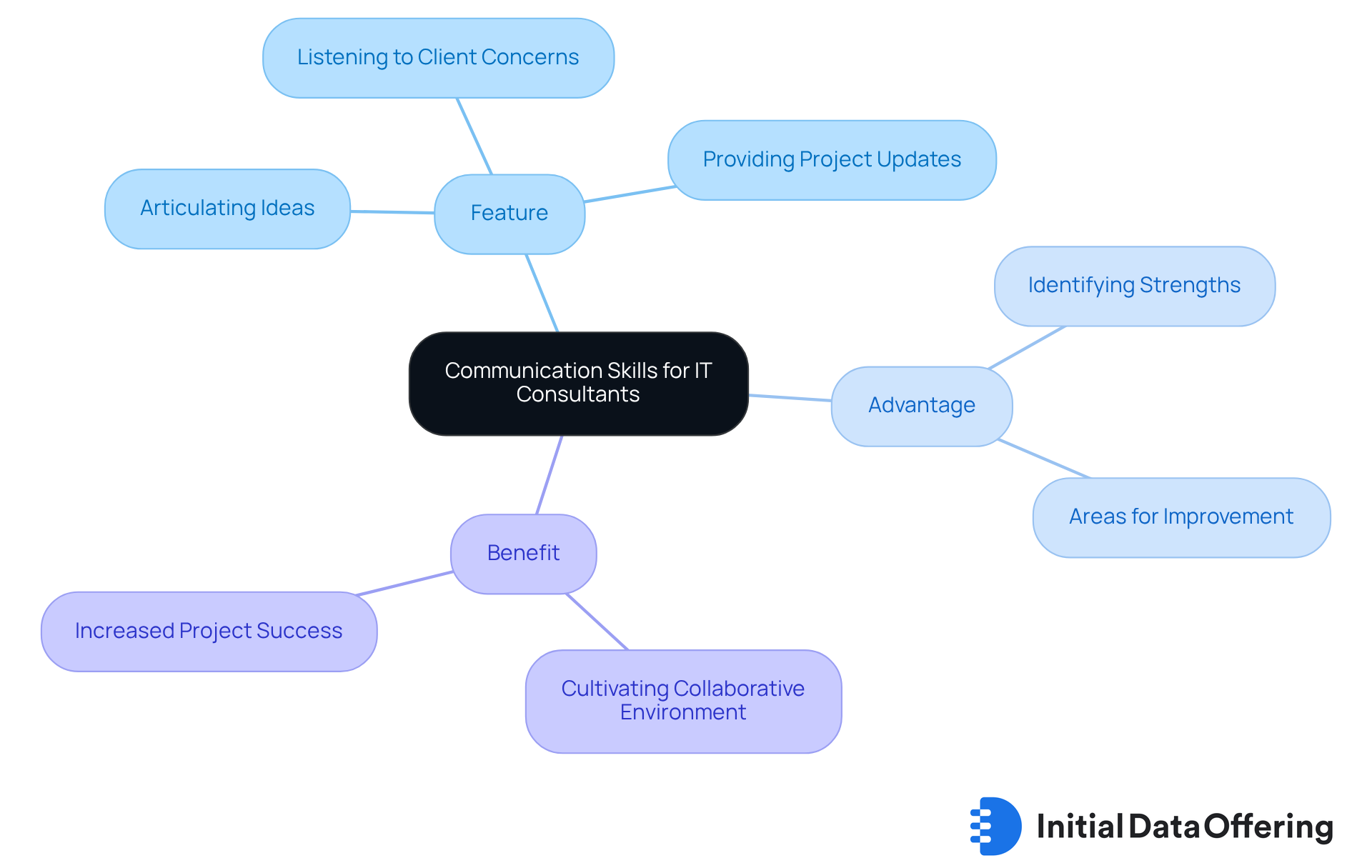
Set Timeline for Deliverables: Manage Expectations and Track Progress
Creating a timeline for deliverables is essential for managing expectations and ensuring accountability in engagements with an IT consultant for small business. Why is this important? Working collaboratively with consultants to define key milestones and deadlines for each phase promotes clarity and alignment. Consistently assessing progress against these timelines not only allows for timely adjustments but also ensures that the initiative remains on course.
Research shows that high-performance consulting firms complete assignments on schedule at a rate of 85.7%, compared to the industry average of 73.4%. This stark contrast highlights the effectiveness of structured timelines. Moreover, organizations employing benchmarking are 20% more likely to finish assignments on schedule and within budget, emphasizing the significance of having a structured approach to management.
Furthermore, 77% of high-achieving initiatives utilize management software, indicating substantial enhancements in team clarity and cooperation-crucial elements for sustaining progress and fulfilling client expectations. By actively participating in this process, companies can navigate potential challenges and ensure that their initiatives align with strategic goals.
For instance, an IT consultant for small business can implement strategies to improve IT project success rates, leading to enhanced project management practices. This demonstrates the effectiveness of structured timelines, ultimately benefiting both the organization and its clients.
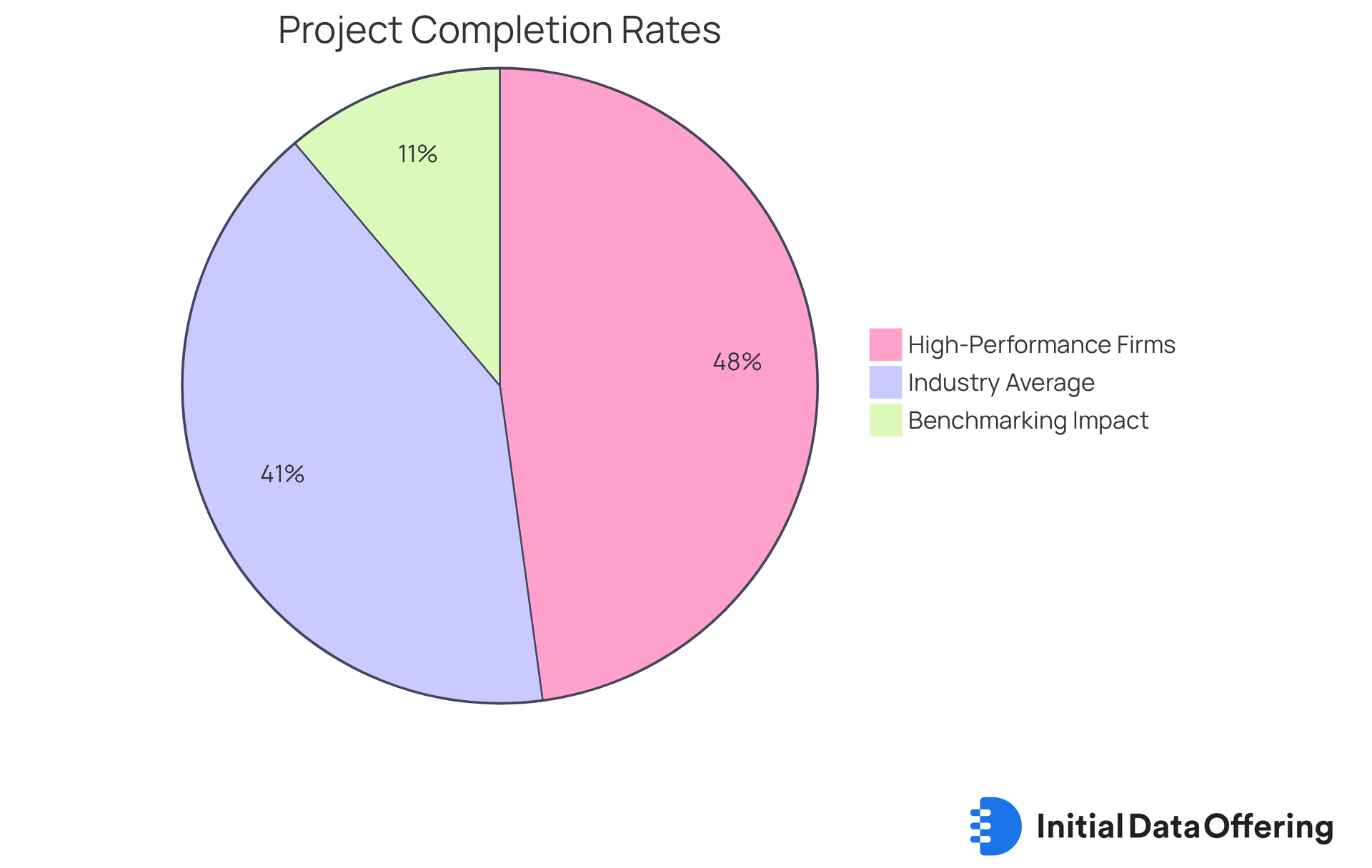
Ensure Ongoing Support and Maintenance: Sustain IT Solutions After Implementation
To enhance the effectiveness of IT solutions post-implementation, organizations must prioritize ongoing support and maintenance within their consulting agreements. This includes features such as:
- Regular system updates
- Troubleshooting
- Comprehensive user training
The advantage of a proactive support strategy is that it not only sustains the functionality of IT solutions but also significantly reduces the risk of disruptions. For example, organizations that invest in continuous training and support report a 55% increase in maintenance staff productivity. This demonstrates the tangible benefits of such commitments.
Furthermore, with 88% of facilities outsourcing some maintenance tasks and 88% of maintenance teams expecting their headcount to increase or remain the same, leveraging external expertise can enhance operational efficiency. This ensures that systems are maintained effectively. Additionally, as experienced technicians retire, the risk of losing critical know-how underscores the importance of establishing clear maintenance agreements. By ensuring that their IT solutions remain robust and responsive to evolving needs, organizations can ultimately drive better outcomes and support long-term success.
How can your organization implement these strategies to improve IT solution effectiveness? Consider the implications of investing in ongoing support and training.
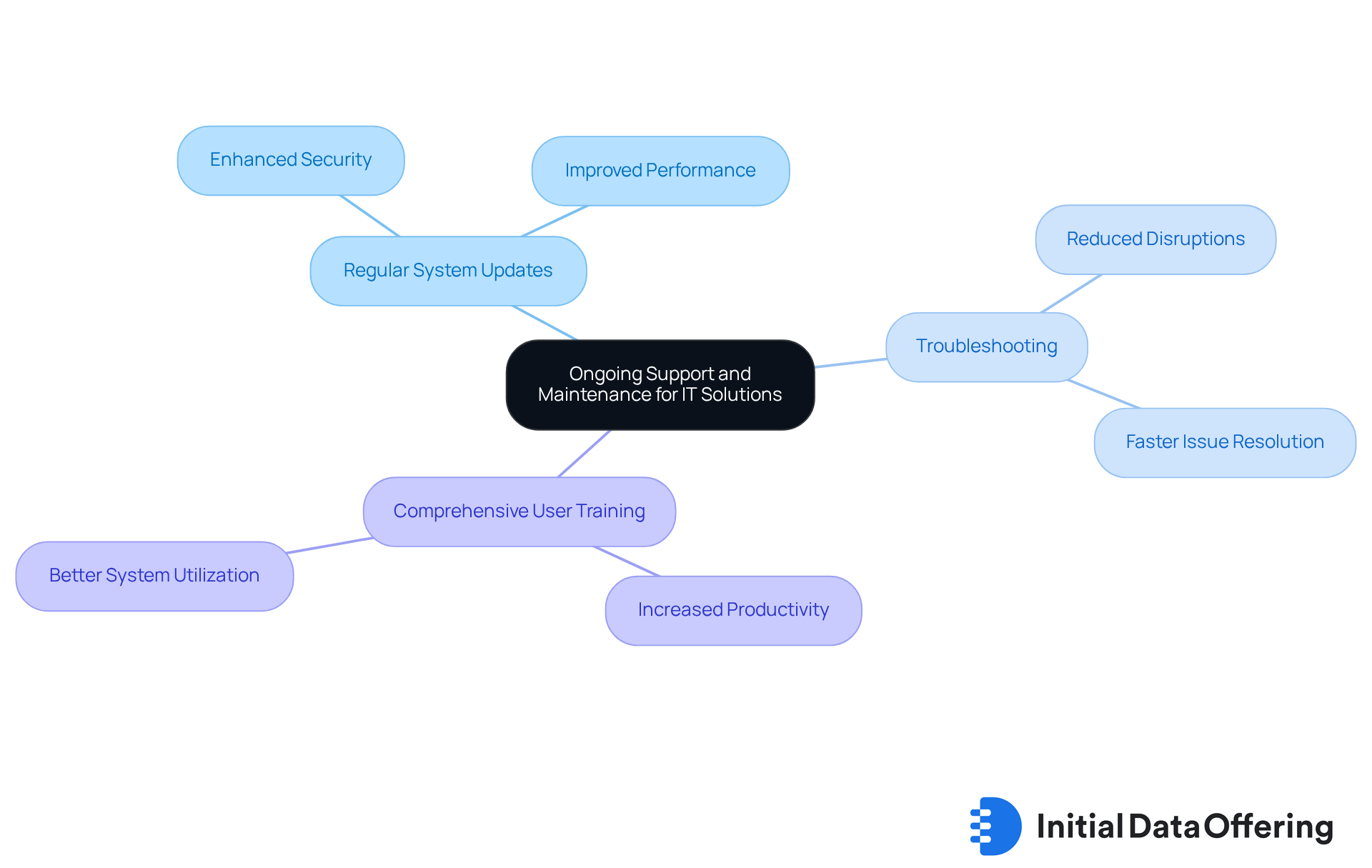
Foster Collaborative Relationship: Enhance Outcomes with IT Consultants
Building a cooperative connection with IT specialists is essential for achieving excellent results. Open communication serves as a key feature that fosters an environment where feedback is actively exchanged. This not only enables organizations to involve consultants in strategic discussions but also enhances trust. The advantage of this partnership approach is that it encourages innovative solutions, significantly benefiting both the project and the organization.
Research underscores the importance of effective communication in IT consulting. For instance, it can lead to a 50% increase in customer satisfaction and an 80% boost in remote worker satisfaction when effective communication tools are utilized. These statistics highlight the tangible benefits of prioritizing communication strategies. Successful partnerships, such as those between companies like Starbucks and Google, demonstrate how collaborative efforts can yield mutual benefits, including enhanced operational efficiency and access to new markets.
Furthermore, organizations with collaborative leaders are four times more likely to outperform their competitors. This statistic emphasizes the critical role of leadership in fostering a culture of open dialogue and feedback. By regularly assessing communication strategies, businesses can maximize the value derived from their engagements with an IT consultant for small business. How can your organization implement these insights to improve collaboration and drive success?
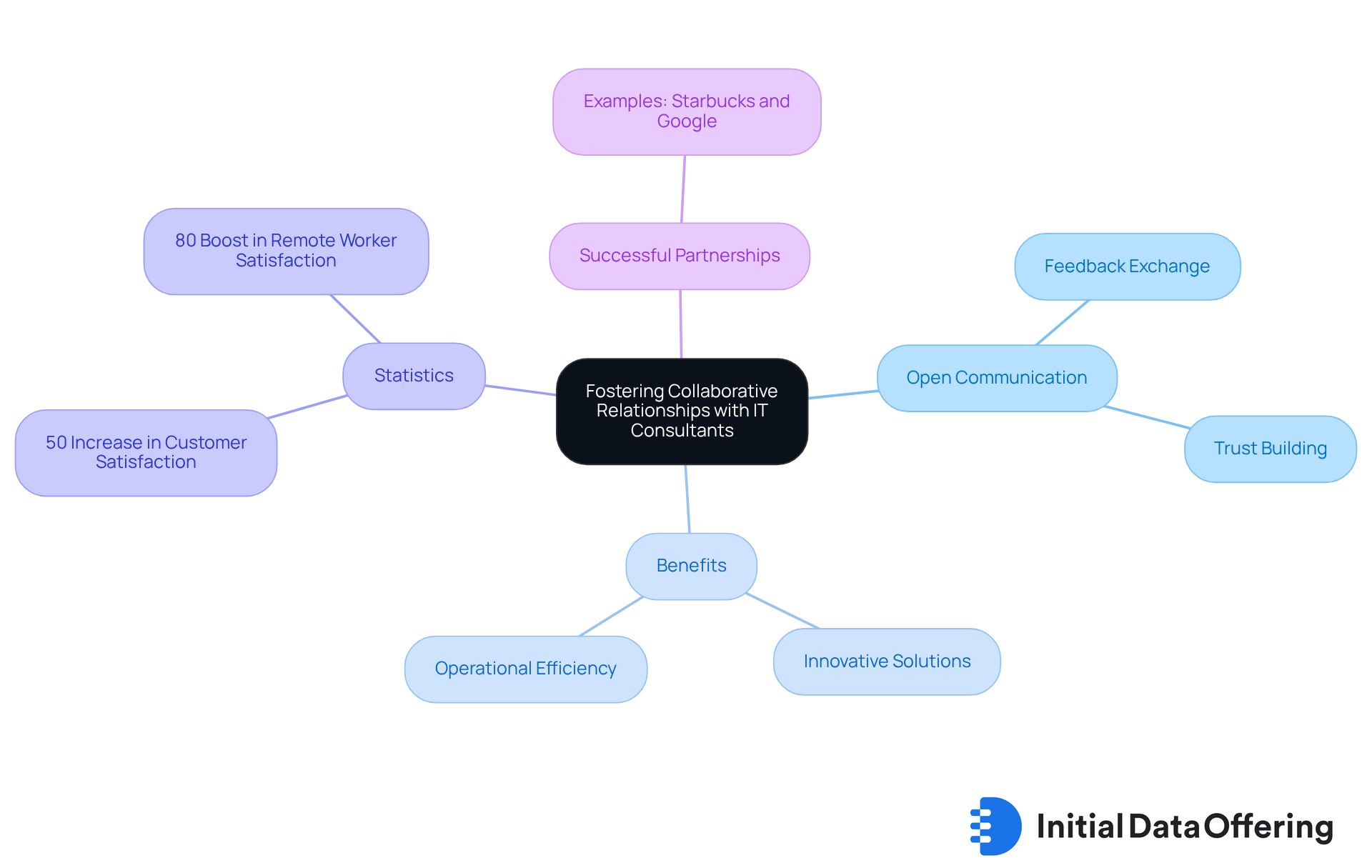
Conclusion
Choosing the right IT consultant for a small business is a critical decision that can significantly impact organizational success. By carefully considering various factors - such as data-driven insights, clear project goals, relevant experience, effective communication, and ongoing support - businesses can establish a solid foundation for fruitful partnerships. This emphasis on these elements not only enhances the selection process but also ensures that the chosen consultant aligns with the specific needs and objectives of the organization.
Essential tips have been outlined throughout the article, highlighting the importance of leveraging quality data for informed decision-making. Defining clear project goals guides consultant engagement, while evaluating the experience and expertise of potential advisors is crucial. Additionally, prioritizing communication skills fosters effective collaboration. Have you considered how these factors can influence your choice of consultant? Setting timelines and ensuring ongoing support post-implementation are also key components for achieving successful outcomes.
Ultimately, investing time and effort into selecting the right IT consultant is paramount for small businesses aiming to innovate and grow. By fostering a collaborative relationship and maintaining open lines of communication, organizations can enhance their IT capabilities and drive long-term success. Embracing these strategies empowers businesses to navigate the complexities of IT consulting, ensuring they are well-equipped to meet their evolving needs and challenges.
Frequently Asked Questions
What is the Initial Data Offering and how can it benefit businesses?
The Initial Data Offering provides companies with access to a diverse range of high-quality datasets powered by SavvyIQ's AI-driven technology. It helps businesses gain insights into past advisor performance, client satisfaction, and industry trends, which are crucial for making informed decisions and enhancing the selection process for IT advisors.
Why is it important to define clear project goals when engaging IT consultants?
Defining clear project goals is essential for effective IT advisory partnerships as it aligns the consultant's efforts with the organization's strategic objectives. Clear objectives increase the likelihood of successful implementation, with studies showing that initiatives with defined goals are significantly more likely to succeed.
What are the consequences of not having clear project goals?
Without clear project goals, initiatives are more likely to fail. Studies indicate that 67% of initiatives fail due to undervaluation of management, highlighting the necessity for clear objectives and capable teams to achieve desired outcomes.
How can organizations improve collaboration with IT consultants?
Organizations can improve collaboration with IT consultants by setting clear objectives and expectations. This clarity fosters a productive partnership focused on achieving measurable results.
What criteria should businesses consider when evaluating IT consultants?
Businesses should evaluate IT consultants based on their experience and expertise, including previous projects, industry certifications, and customer testimonials. Recognized certifications enhance credibility, and a proven track record of customer satisfaction indicates the consultant's ability to understand unique challenges and provide tailored solutions.
Why are certifications important when selecting IT consultants?
Certifications, such as CompTIA Security+ or AWS Certified Solutions Architect, demonstrate a consultant's commitment to professional growth and enhance their credibility. Employers believe that certified employees add significant value, often estimated at $10,000 or more annually.
What trend is observed in the selection of IT consultants by companies?
Companies are increasingly favoring specialized experts and smaller, specialized firms for high-value projects. This trend highlights the importance of selecting advisors based on their past achievements and the specific needs of the organization to foster innovation and strategic growth.